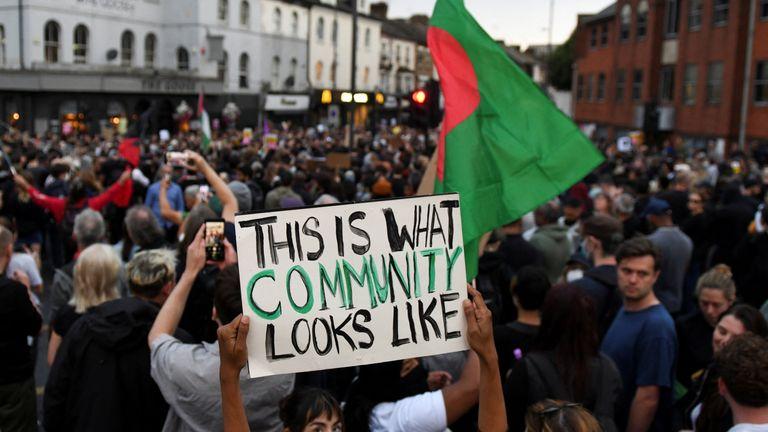In recent months, the United Kingdom has seen a significant increase in the number of peaceful protesters being arrested and charged with terrorism offenses, raising alarm among civil rights advocates and legal experts. This controversial approach has sparked widespread debate over the government’s use of anti-terrorism legislation to curb dissent, prompting questions about the balance between national security and the right to peaceful assembly. NBC News investigates the circumstances behind these arrests, exploring what this trend means for democracy and freedom of expression in the U.K.
Government’s Use of Terrorism Laws Sparks Concerns Over Civil Liberties
Recent reports highlight a troubling trend where peaceful activists in the U.K. face arrests under terrorism legislation traditionally reserved for violent extremists. Critics argue this broad application risks conflating dissent with criminal behavior, potentially undermining fundamental rights such as freedom of expression and assembly. Civil liberties organizations warn that such measures may chill legitimate protest activities, fostering an atmosphere of fear rather than civic engagement. The government’s expansive interpretation raises questions about accountability and proportionality in balancing national security with individual freedoms.
Experts and campaigners emphasize several key concerns regarding this approach:
- Ambiguity in Legal Definitions: Vague terms within terrorism laws can be leveraged to target nonviolent actions.
- Disproportionate Policing: Heavy-handed tactics against activists risk damaging public trust in law enforcement.
- Potential for Abuse: Law enforcement might exploit these laws for political suppression.
The implications of these developments are far-reaching, with debates intensifying around how democratic societies can ensure security without compromising core civil liberties.
| Aspect | Concerns | Impact on Protesters |
|---|---|---|
| Legal Ambiguity | Broad interpretations | Risk of wrongful arrests |
| Enforcement | Intense surveillance | Increased intimidation |
| Political Use | Suppressing dissent | Reduced activism |
Legal Experts Question Criteria for Labeling Peaceful Protests as Terrorism
Legal professionals across the U.K. are raising alarm over the expanding use of terrorism legislation to prosecute individuals engaged in nonviolent demonstrations. Critics argue that the broad interpretation of “terrorism” risks criminalizing the fundamental right to peaceful assembly, eroding civil liberties and undermining democratic principles. In recent cases, authorities have reportedly relied on vague criteria, including the mere disruption of public order or planned civil disobedience, to justify arrests under anti-terrorism laws. Experts suggest this approach blurs the legal boundaries intended to target genuinely violent and dangerous actors, instead casting a chilling effect on legitimate protest movements.
The debate centers on several contested elements in current legislation:
- Definition elasticity: How broadly “terrorism” is interpreted by enforcement agencies and courts.
- Threshold of violence: Whether nonviolent civil disobedience qualifies as terrorism-related conduct.
- Proportionality: The appropriateness of using terrorism charges compared to lesser offenses like public order violations.
To illustrate discrepancies in application, the following table contrasts examples of charges brought against peaceful protesters with typical terrorism offenses:
| Charge Type | Behavior | Legal Concern |
|---|---|---|
| Terrorism | Bombing plot, armed attacks | Clear intent to cause widespread harm |
| So-called “terrorism” | Blocking traffic during protests | Disputed criminalization of peaceful disruption |
Calls for Greater Transparency and Safeguards in Protester Arrests
Concerns are mounting among human rights organizations and civil liberties advocates who argue that the U.K.’s use of terrorism charges against peaceful protesters dangerously blurs the lines between legitimate dissent and criminal conduct. Critics assert that this approach not only undermines the democratic right to protest but also sets a precedent for the misuse of anti-terrorism laws to stifle opposition voices. The lack of clear criteria for these arrests has fueled calls for greater transparency in police operations and judicial proceedings related to protest activities.
Advocates emphasize the need for enhanced safeguards to protect individuals who engage in lawful assembly. They propose measures such as:
- Independent oversight of arrest procedures during demonstrations
- Mandatory public reporting on the use of terrorism-related charges in protest contexts
- Strengthening legal protections for peaceful protesters against disproportionate prosecution
| Safeguard Measure | Purpose |
|---|---|
| Independent Oversight | Ensure accountability in police conduct |
| Public Reporting | Maintain transparency on arrests and charges |
| Legal Protections | Prevent misuse of anti-terrorism laws |
Insights and Conclusions
As the debate over national security and civil liberties intensifies, the U.K.’s use of terrorism charges against peaceful protesters raises pressing questions about the boundaries of lawful dissent. Critics argue that such measures risk eroding fundamental democratic rights, while authorities maintain they are necessary to protect public safety. How this balance is navigated in the coming months will have significant implications not only for protesters but for the future of free expression across the country.




